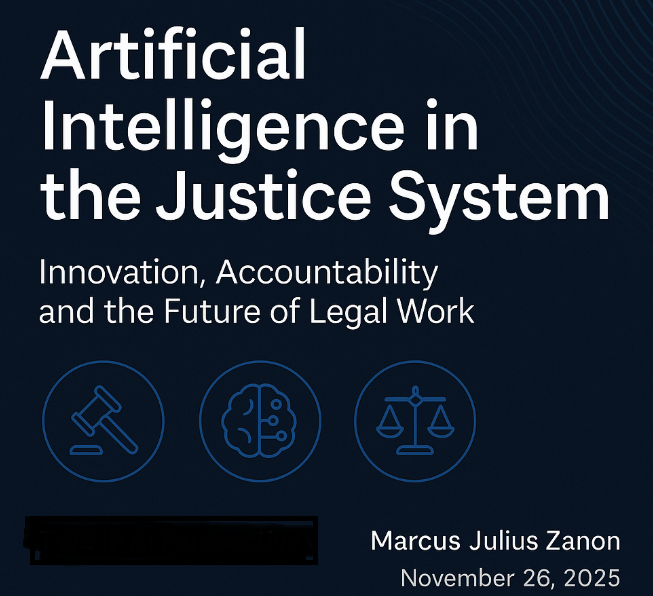AI is no longer a technological novelty in the justice system — it is becoming an institutional force that can either strengthen democracy or quietly erode it.
Below is a TWS-IP-AI-Tool–style strategic reading of the hearing: key insights, structural risks, and governance priorities for the next wave of digital justice in Brazil.
1. From Digital Justice to Intelligently Augmented Justice
According to Counselor João Paulo Schoucair, Chair of the CNJ’s Commission on Technology and Innovation, the Brazilian judiciary has already completed its move from paper to electronic case files. The next step is the integration of assistive AI, with three main goals:
- Speeding up and standardizing case triage and classification;
- Automating repetitive, mechanical workflows that consume human time;
- Providing smarter decision support for judges and clerks.
The CNJ’s message is explicit: AI is an augmentation layer, not a substitute for judges or court staff. Human judges remain fully responsible for decisions, reasoning and legal accountability.
This positioning aligns with global frameworks such as the EU AI Act, OECD principles and WIPO guidance, which insist on “human-in-command” models of AI governance.
2. Automation Without Guarantees? The Risk of Diluting Due Process
Worker federations like Fenajufe and Fenajud brought critical questions to the table:
- How are AI models validated and by whom?
- Who is liable when the algorithm misclassifies, delays or prioritizes wrongly?
- Will automation be used as a shortcut to reduce staff or outsource strategic functions?
- How can citizens trust AI-supported workflows if the systems are black boxes?
From the perspective of court workers and unions, automation must not result in:
- Loss of job security and career development;
- Delegation of core judicial functions to opaque algorithms;
- Concentration of power in internal IT units or private vendors.
In other words, the justice system must modernize without undermining procedural guarantees or democratic control.
3. Explainability, Contestability and the Right to Understand AI
Representatives of the legal profession and the Public Defender’s Office — including Laura Schertel and Luciana Jordão da Motta — emphasized a constitutional baseline:
Every judicial action influenced by AI must be explainable, contestable and ultimately attributable to a human decision-maker.
That principle has concrete implications:
- AI outputs cannot replace a judge’s duty to present clear reasoning and legal grounds;
- Litigants must be informed when AI systems have triaged, clustered or prioritized their cases;
- Black-box automation is incompatible with transparent, fair adjudication.
In short, AI may assist the justice system — but it cannot obscure it.
4. Legal Work in Transition: Transformation, Not Extinction
Across different institutions, a strong consensus emerged: AI will not eliminate judicial workers — it will change what they do.
Expected shifts
- From manual data entry → to supervision of AI-powered workflows;
- From repetitive tasks → to analytical and interpretative work;
- From handling paper or PDFs → to validating alerts, summaries and classifications generated by AI.
Strategic needs
- AI literacy for judges, clerks, analysts and technicians;
- Training in algorithmic auditing and critical evaluation of AI outputs;
- Structured requalification plans for hybrid digital roles in the justice system.
The real systemic risk is not “robots replacing humans”, but digital inequality inside the judiciary: some courts advancing with high-quality tools and training, others left behind, deepening bottlenecks and access gaps.
5. A Governance Roadmap for Responsible AI in Justice
The hearing also pointed toward a practical roadmap for responsible AI governance in Brazil’s justice system. From a TWS IP AI Tool perspective, six principles stand out:
- Algorithmic Transparency: AI models used in courts must be documented, auditable and traceable — including data sources, limitations and known risks.
- Mandatory Human Oversight: AI may assist; it may not adjudicate. Human responsibility for outcomes is non-negotiable.
- Data Protection by Design: Full compliance with LGPD, with strict purpose limitation, data minimization and security safeguards.
- Fairness and Anti-Bias Controls: Continuous monitoring, independent testing environments and clear metrics for bias, error and impact.
- Workforce Capacity Building: Long-term, structured training for legal professionals, so AI increases quality rather than asymmetries.
- Technological Independence: Avoid exclusive dependence on opaque, proprietary solutions that cannot be independently audited or replaced.
Conclusion: AI Can Expand Access to Justice — If Governance Is Strong
The November 2025 hearing revealed a justice system at a strategic crossroads. Brazil now faces a pivotal choice:
- AI can accelerate justice, reduce backlog and improve consistency — making rights more accessible in practice; or
- AI can amplify inequalities, obscure decision-making and undermine public trust if deployed without robust governance.
The path forward requires transparent algorithms, skilled professionals, strong institutions and democratic oversight. If these pillars guide implementation, the justice system of the future can be:
- more agile,
- more intelligent,
- more accessible,
- and more aligned with constitutional guarantees.
AI in the justice system is inevitable.
Human, fair and accountable justice must remain non-negotiable.

